- Home
- Harlan Coben
Three Harlan Coben Novels Page 9
Three Harlan Coben Novels Read online
Page 9
“Myron?”
“What?”
“I asked for the truth.”
Myron picked up his fork, took a bite, chewed slowly. “The lights didn’t just go out, Rex. I had a full-fledged power outage. A lifetime blackout.”
“I know that.”
“So I needed to push past it.”
“And?”
“And that’s it.”
Rex shook his head and smiled.
“What?”
“Next time,” Rex said. He picked up his fork. “You’ll tell me next time.”
“You’re a pain in the ass.”
“But you love me, remember?”
By the time they finished dinner and drinks, it was late. Drinking for a second night in a row. Myron Bolitar, lush of the stars. He made sure that Rex was safely back in his residence before heading to his parents’ condo. He had a key. He slipped it in quietly so as to not awaken Mom and Dad. He knew that it would do no good.
The TV was on. His father sat in the living room. When Myron entered, Dad faked like he was just waking up. He wasn’t. Dad always stayed awake until Myron came home. Didn’t matter what time Myron returned. Didn’t matter that Myron was now in his fourth decade.
Myron came up behind his father’s chair. Dad turned around and gave him the smile, the one he saved only for Myron, the one that told Myron that he was the single greatest creation in this man’s eyes and how could you beat that?
“Have fun?”
“Rex is a pretty cool guy,” Myron said.
“I used to like his movies.” His father nodded a few times too many. “Sit for a second.”
“What’s up?”
“Just sit, okay?”
He did. Myron folded his hands and put them in his lap. Like he was eight. “Is this about Mom?”
“No.”
“Her Parkinson’s is getting worse.”
“That’s how it is with Parkinson’s, Myron. It gets worse.”
“Is there anything I can do?”
“No.”
“I think I should say something, at least.”
“Don’t. It’s better. And what would you say that your mother doesn’t already know?”
Now it was Myron’s turn to nod a few times too many. “So what do you want to talk about?”
“Nothing. I mean, your mother wants us to have a heart-to-heart.”
“What about?”
“Today’s New York Times.”
“Excuse me?”
“There was something in it. Your mother thinks you’ll be upset and that we should talk. But I don’t think I’m going to do that. I think what I’m going to do instead is hand you the newspaper and let you read it for yourself and leave you alone for a while. If you want to talk, you come and get me, okay? If not, I’ll give you your space.”
Myron frowned. “Something in The New York Times?”
“Sunday Styles section.” Dad stood and pointed with his chin toward the pile of Sunday papers. “Page sixteen. Good night, Myron.”
“Good night, Dad.”
His father moved down the hall. No need to tiptoe. Mom could sleep through a Judas Priest concert. Dad was the night watchman, Mom the sleepy princess. Myron stood. He picked up the Sunday Styles section, turned to page sixteen, saw the photo, and felt the stiletto pierce his heart.
The New York Times Sunday Styles was upscale gossip. The most well-read pages were for wedding announcements. And there, on page sixteen, in the top left-hand corner, was a photograph of a man with Ken-doll good looks and teeth that were too perfect to be capped. He had a Republican senator’s cleft chin, and his name was Stone Norman. The article said Stone ran and operated the BMV Investment Group, a highly successful financial enterprise specializing in major institutional trades.
Snore.
The engagement announcement said that Stone Norman and his wife-to-be would be married next Saturday at Tavern on the Green in Manhattan. A reverend would preside over the ceremony. Then the newlyweds would begin their lives together in Scarsdale, New York.
More snore. Stone Snore.
But none of that was what had pierced his heart. No, what did that, what really hurt and made the knees buckle, was the woman ol’ Stone was marrying, the one smiling with him in that photograph, a smile Myron still knew far too well.
For a moment Myron just stared. He reached out and brushed the bride-to-be’s face with his finger. Her biography stated that she was a best-selling writer who’d been nominated for both the PEN/Faulkner and National Book Award. Her name was Jessica Culver, and though it didn’t say so in the article, for more than a decade she had been the love of Myron Bolitar’s life.
He just sat and stared.
Jessica, the woman he’d been sure was his soul mate, was getting married to someone else.
He had not seen her since they broke up seven years ago. Life had gone on for him. It had, of course, gone on for her. Why should he be surprised?
He put down the paper, then picked it up again. A lifetime ago Myron had asked Jessica to marry him. She had said no. They stayed together on and off for the next decade. But in the end Myron wanted to get married, and Jessica didn’t. She pretty much scoffed at the bourgeois idea of it all—the suburbs, the picket fence, the children, the barbecues, the Little League games, the life Myron’s parents had led.
Except now Jessica was marrying big Stone Norman and moving to the über-suburb of Scarsdale, New York.
Myron carefully folded the paper and put it on the coffee table. He stood with a sigh and headed down the corridor. He flicked off the lights as he went. He passed his parents’ bedroom. The reading lamp was still on. His father faked a cough to let Myron know he was there.
“I’m fine,” he said out loud.
His father did not respond, and Myron was grateful. The man was like a master on the tightrope, managing the nearly impossible feat of showing he cared without butting in or interfering.
Jessica Culver, the love of his life, the woman he’d always believed was his destined soul mate, was getting married.
Myron wanted to sleep on that one. But sleep would not come.
CHAPTER 14
Time to talk to Aimee Biel’s parents.
It was six in the morning. County investigator Loren Muse sat on her floor cross-legged. She wore shorts, and the quasi-shag carpeting made her legs itch. Police files and reports were spread out everywhere. In the center was the timetable she’d made up.
A harsh snoring came from the other room. Loren had lived alone in this same crappy apartment for more than a decade now. They called them “garden” apartments, though the only thing that seemed to grow was a monotonous red brick. They were sturdy structures with the personality of prison cells, way stations for people on the way up or on the way down, or, for a very few, stuck in a sort of personal-life purgatory.
The snoring did not come from a boyfriend. Loren had one—a total loser named Pete—but her mother, the multimarried, once-desirable, now-flabby Carmen Valos Muse Brewster Whatever was between men and thus living with her. Her snoring had the phlegm of a lifelong smoker, mixed with a few too many years of cheap wine and tacky song.
Cracker crumbs dominated the counter. An open jar of peanut butter, the knife sticking out like Excalibur, stood in the middle like a watchtower. Loren studied the phone logs, the credit card charges, the E-ZPass reports. They painted an interesting picture.
Okay, Loren thought, let’s map this out.
1:56 A.M.: Aimee Biel uses the 52nd Street Citibank ATM machine—the same one used by Katie Rochester three months ago. Weird.
2:16 A.M.: Aimee Biel places a call to the Livingston residence of Myron Bolitar. The call lasts only seconds.
2:17 A.M.: Aimee places a call to a mobile phone registered to Myron Bolitar. The call lasts three minutes.
Loren nodded to herself. It seemed logical that Aimee Biel had first tried Bolitar’s home and when he didn’t answer—that would explain the brevity of the fir
st call—she called his mobile.
Back to it:
2:21 A.M.: Myron Bolitar calls Aimee Biel. This call lasts one minute.
From what they’d been able to dig up, Bolitar often stayed in New York City at the Dakota apartment of a friend named Windsor Horne Lockwood III. Lockwood was known to police; despite a ritzy, Main Line upbringing, he was a suspect in several assaults and, yes, even a couple of homicides. The man had the craziest reputation Loren had ever seen. But again, that did not seem relevant to the case at hand.
The point here was, Bolitar was probably staying at Lockwood’s apartment in Manhattan. He kept his car in a nearby lot. According to the night attendant, Bolitar had taken the car out sometime around 2:30 A.M.
They had no proof yet, but Loren was fairly sure Bolitar had gone to midtown and picked up Aimee Biel. They were working on getting surveillance videos from the nearby businesses. Maybe Bolitar’s car would be on one. But for now, it seemed like a fairly likely conclusion.
More from the time line:
3:11 A.M.: There was a credit card charge on Bolitar’s Visa account from an Exxon gas station on Route 4 in Fort Lee, New Jersey, right off the George Washington Bridge.
3:55 A.M.: the E-ZPass on Bolitar’s car showed him heading south on the Garden State Parkway, crossing the Bergen County tolls.
4:08 A.M.: the E-ZPass hit the Essex County tolls, showing that Bolitar was still traveling south.
That was it on the tolls. He could have gotten off at Exit 145, which would lead him to his residence in Livingston. Loren drew the route out. It made no sense. You wouldn’t go up over the George Washington Bridge and then down the parkway. And even if you did, it wouldn’t take forty minutes to get to the Bergen toll. It would take at most, that time of night, twenty minutes.
So where had Bolitar gone?
She went back to her time line. There was a gap of more than three hours, but at 7:18 A.M., Myron Bolitar placed a call to Aimee Biel’s cell phone. No answer. He tries twice more that morning. No answer. Yesterday he called the Biels’ home number. That was the only call that lasted more than a few seconds. Loren wondered if he talked to the parents.
She picked up her phone and dialed Lance Banner.
“What’s up?” he asked.
“Did you tell Aimee’s parents about Bolitar?”
“Not yet.”
“I think,” Loren said, “that now might be the time.”
Myron had a new morning routine. The first thing he did was grab the newspaper and check for war casualties. He looked at the names. All of them. He made sure that Jeremy Downing wasn’t listed. Then he went back and took the time to read every name again slowly. He read the rank and hometown and age. That was all they put. But Myron imagined that every dead kid listed was another Jeremy, was like that terrific nineteen-year-old kid who lives down your street, because, simple as it sounded, they were. For just a few minutes Myron imagined what that death meant, that this young, hopeful, dream-filled life was gone forever, what the parents must be thinking.
He hoped that our leaders did something similar. But he doubted it.
Myron’s cell phone rang. He checked the caller ID. It read SWEET CHEEKS. That was Win’s unlisted number. Myron clicked it on and said hello.
Without preamble, Win said, “Your flight arrives at one p.m.”
“You work for the airlines now?”
“Work for the airlines,” Win repeated. “Good one.”
“So what’s up?”
“Work for the airlines,” Win said again. “Wait, just let me savor that line for a moment. Work for the airlines. Hilarious.”
“You done?”
“Hold on, let me get a pen so I can write that one down. Work. For. The. Airlines.”
Win.
“You done now?”
“Let me try again: Your flight arrives at one p.m. I will meet you at the airport. I have two tickets to the Knicks game. We will sit courtside, probably next to Paris Hilton or Kevin Bacon. Personally, I’m pulling for Kevin.”
“You don’t like the Knicks,” Myron said.
“True.”
“In fact, you don’t like going to basketball games. So why . . . ?” Myron saw it. “Damn.”
Silence.
“Since when do you read the Styles Section, Win?”
“One o’clock. Newark Airport. See you then.”
Click.
Myron hung up the phone and couldn’t help but smile. That Win. What a guy.
He headed into the kitchen. His father was up and making breakfast. He said nothing about Jessica’s upcoming nuptials. Mom, however, jumped from her chair, rushed over to him, gave him a look that suggested a terminal illness, asked if he was all right. He assured her that he was fine.
“I haven’t seen Jessica in seven years,” he said. “It’s no big deal.”
His parents both nodded in a way that suggested that they were humoring him.
A few hours later he took off for the airport. He had tossed and turned, but in the end he really was all right with it. Seven years. They had been over for seven years. And while Jessica had been the one with the upper hand throughout most of their time together, Myron had been the one who’d finally put an end to it.
Jessica was the past. He took out his cell phone and called Ali—the present.
“I’m at Miami airport,” he said.
“How was your trip?”
Hearing Ali’s voice filled him with warmth. “It was good.”
“But?”
“But nothing. I want to see you.”
“How about around two? The kids will be out, I promise.”
“What have you got in mind?” he asked.
“The technical term would be—hold on, let me check my thesaurus—‘a nooner.’ ”
“Ali Wilder, you little vixen.”
“That I am.”
“I can’t make it at two. Win is taking me to see the Knicks.”
“How about immediately following the game?” she asked.
“Man, I hate it when you play hard to get.”
“I’ll take that as yes.”
“Very much so.”
“You okay?” she asked.
“I’m fine.”
“You sound a little funny.”
“I’m trying to sound very funny.”
“Then don’t try so hard.”
There was an awkward moment. He wanted to tell her that he loved her. But it was too soon. Or maybe, with what he’d learned about Jessica, the timing was wrong. You don’t want to say something like that for the first time for the wrong reason.
So instead he said, “They’re boarding my flight.”
“See you soon, handsome.”
“Wait, if I get there in the evening, will it still be a ‘nooner’? Wouldn’t it be an ‘evening-er’?”
“That would take too long to say. I don’t want to waste any time.”
“And on that note . . .”
“Stay safe, handsome.”
Erik Biel sat alone on the couch while his wife, Claire, chose a chair. Loren noticed that. One would think that a couple in a situation like this would sit next to each other, draw comfort from each other. The body language here suggested that both wanted to be as far away from the other as possible. It could mean a rift in the relationship. Or it could mean that this experience was so raw that even tenderness—especially tenderness—would sting like hell.
Claire Biel had served them tea. Loren really hadn’t wanted any, but she learned that most people relaxed if you allow them to be in control of something, of anything, if you allow them to do something mundane or domestic. So she had accepted. Lance Banner, who remained standing behind her, had declined.
Lance was letting her take the lead. He knew them. That might help for some questioning, but she’d get the ball rolling. Loren took a sip of the tea. She let the silence work them a little—let them be the first to speak. Some might view it as cruel. It wasn’t, if it helped find Aimee.
If Aimee were found okay, it would be quickly forgotten. If she weren’t, the discomfort from silence would be nothing compared to what they would then endure.
“Here,” Erik Biel said, “we made a list of her close friends and their phone numbers. We’ve already called all of them. And her boyfriend, Randy Wolf. We spoke to him too.”
Loren took her time looking over the names.
“Have there been any developments?” Erik asked.
Erik Biel was, Loren thought, the poster boy for uptight. The mother, Claire, well, you could see the missing kid etched into her face. She hadn’t slept. She was a mess. But Erik, with his starched dress shirt and tie and recently shaved face, somehow looked more harried. He was trying so hard to keep it together that you just knew that there would be no slow fray here. When it came apart, it would be ugly and maybe permanent.
Loren handed the paper to Lance Banner. She turned and sat up straight. She kept her eyes on Erik’s face as she dropped the bomb: “Do either of you know a man named Myron Bolitar?”
Erik frowned. Loren moved her gaze toward the mother. Claire Biel looked as if Loren had asked if she could lick their toilet.
“He’s a family friend,” Claire Biel said. “I’ve known him since junior high.”
“Did he know your daughter?”
“Of course. But what does—”
“What sort of relationship did they have?”
“Relationship?”
“Yes. Your daughter and Myron Bolitar. What sort of relationship did they have?”
For the first time since they’d entered the house, Claire slowly turned and looked to her husband for guidance. Erik too turned toward his wife. They both wore the faces of someone who’d been smacked in the gut by a two-by-four.
Erik finally spoke. “What are you suggesting?”
“I’m not suggesting anything, Mr. Biel. I’m asking you a question. How well did your daughter know Myron Bolitar?”
Claire: “Myron is a family friend.”
Erik: “He wrote Aimee a recommendation letter for her college application.”
Claire nodded with vigor. “Right. Like that.”

 The Innocent
The Innocent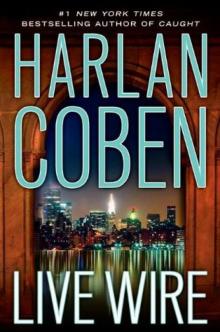 Live Wire
Live Wire Play Dead
Play Dead Drop Shot
Drop Shot Seconds Away
Seconds Away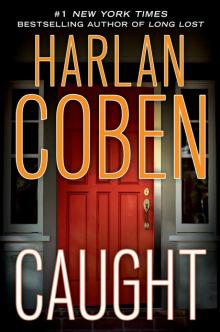 Caught
Caught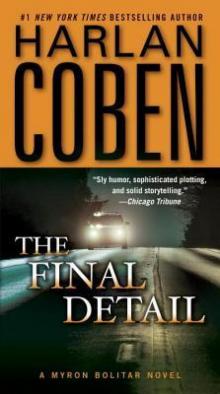 The Final Detail
The Final Detail Fade Away
Fade Away Home
Home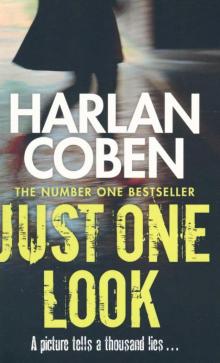 Just One Look
Just One Look Hold Tight
Hold Tight Fool Me Once
Fool Me Once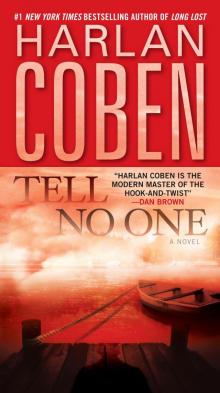 Tell No One
Tell No One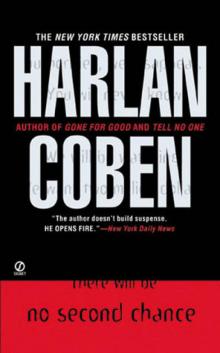 No Second Chance
No Second Chance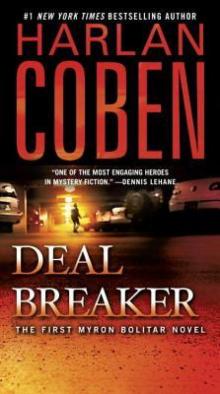 Deal Breaker
Deal Breaker Long Lost
Long Lost One False Move
One False Move The Woods
The Woods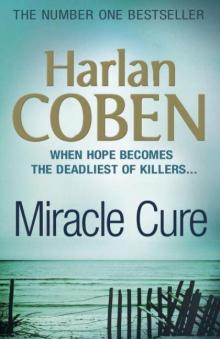 Miracle Cure
Miracle Cure Found
Found Don't Let Go
Don't Let Go Darkest Fear
Darkest Fear The Stranger
The Stranger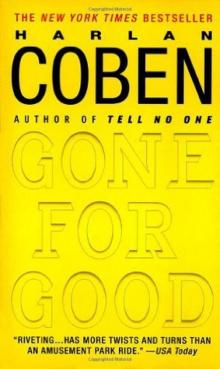 Gone for Good
Gone for Good Back Spin
Back Spin Shelter
Shelter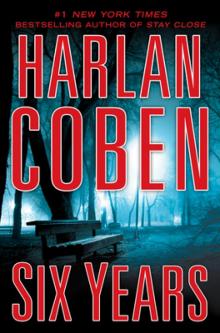 Six Years
Six Years The Boy from the Woods
The Boy from the Woods Missing You
Missing You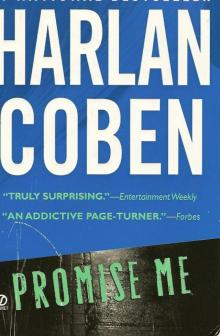 Promise Me mb-8
Promise Me mb-8 The Final Detail: A Myron Bolitar Novel
The Final Detail: A Myron Bolitar Novel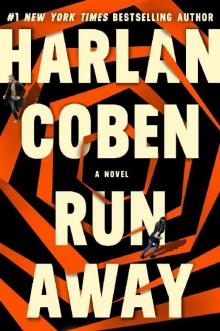 Run Away
Run Away One False Move: A Myron Bolitar Novel
One False Move: A Myron Bolitar Novel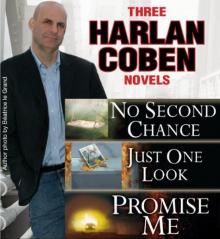 Three Harlan Coben Novels
Three Harlan Coben Novels the Woods (2007)
the Woods (2007) Tell No One (2001)
Tell No One (2001) the Innocent (2005)
the Innocent (2005) The Myron Bolitar Series 7-Book Bundle
The Myron Bolitar Series 7-Book Bundle Gone for Good (2002)
Gone for Good (2002) Caught (2010)
Caught (2010) Hold Tight (2008)
Hold Tight (2008)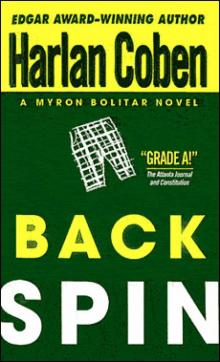 04 - Back Spin
04 - Back Spin Miracle Cure (1991)
Miracle Cure (1991) Harlan Coben 3 Novel Collection
Harlan Coben 3 Novel Collection Just One Look (2004)
Just One Look (2004)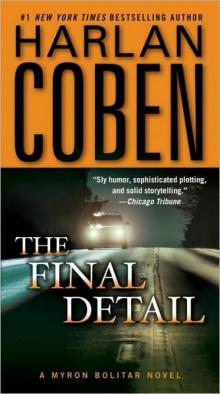 The Final Detail mb-6
The Final Detail mb-6 Play Dead (2010)
Play Dead (2010)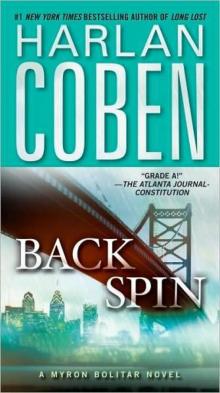 Back Spin mb-4
Back Spin mb-4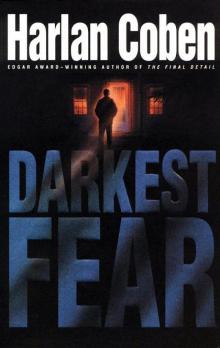 Darkest Fear mb-7
Darkest Fear mb-7